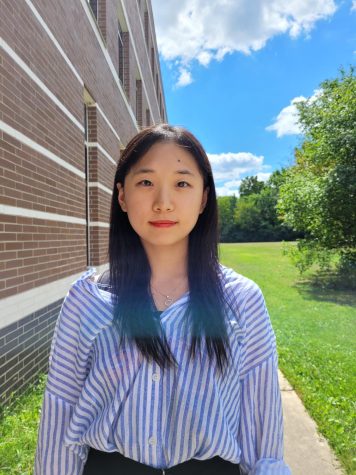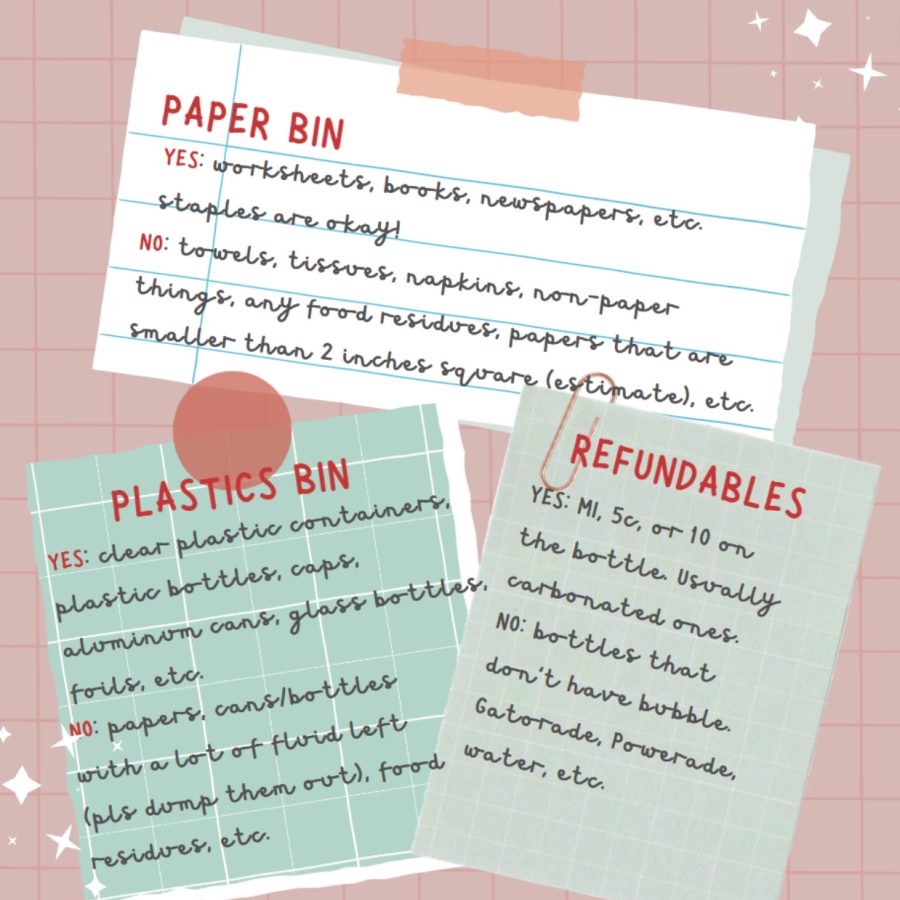Recycling Rules to the Rescue!
The recycling errors within Troy High School.
A guide on how to dispose of different types of waste.
Can a packet of paper with a staple go into the paper recycling bin or should the staple be removed? Are paper coffee cups coated with plastic recyclable? If little hole punch paper residues can’t be recycled, up till how small of a paper can be recycled? Even though the norms of recycling seem to be clear– paper into the paper bin, plastic into the plastic bin– there are many gray areas that students are simply not taught at school. This results in trash getting sorted incorrectly.
Luckily, Troy High School’s Environmental Activist Club sorts through all the trash in the paper and plastic recycling bins into what is recyclable and what is not, and properly disposes of them.
“We’ll do paper, cardboard, plastic, cans, and that’s pretty much what we do,” shared Robert Zynda, the teacher in charge of the Environmental Activist Club for over two decades.
According to Daniel Wang, the senior Environmental Activist Club treasurer, more than half of the bins contain incorrectly sorted materials within them: “There are almost always one or two water bottles in every paper recycling bin.”
The lack of knowledge and care for recycling poses problems for this club.
Wang continued, “Incorrectly sorted trash inside the recycling bins slows down our process and sometimes makes it impossible for us to separate the trash completely from the recycling pile.”
According to Wang, “Trash inside the paper recycling bin is the most problematic. It’s usually the plastic bottles, wrappers, and tissues which we have to take out by hand before taking the papers out. Problems regarding food residues/too much fluid in some bottles are fairly common as well.”
Paper recycling bins should contain: most papers, finished worksheets, books, newspapers, etc. Papers with staples are also allowed in this bin. However, throughout Wang’s years in the Environmental Activist club, he found many incorrectly sorted items, most common ones being: paper towels, tissues, napkins, food residues, and papers that are too small to be recycled, those that were less than 2 squared inches, in the paper bin.
“Certain paper products such as the kleenex, greasy pizza containers, or a lot of people put little hole punch things, are not recyclable,” said Zynda.
Paper bins are not the only incorrectly sorted recycling bin. Wang also found papers, cans/bottles with a lot of fluid left , food residues, while sorting the plastic recycling bins in this school. The plastic recycling bins should contain clear plastic containers, plastic bottles, caps, aluminum cans, glass bottles, foils, etc.
On the bottom of some plastic packaging are resin codes that categorize plastics. These resin codes are numbered from one to seven, and each number represents a type of plastic: one represents PETE, two represents HDPE, and so on, except number seven represents multiple recyclable plastics such as acrylic, polycarbonate, nylon, fiberglass, etc.
“If it doesn’t have a resin code, plastic goes into the garbage can,” Zynda said. “A lot of kids would put candy wrappers, Starbucks coffee cups, and straws in the recycling bin, which are not recyclable. There’s a lot of things they think are all trash, kleenex, and they throw them into the wrong box all the time. So that’s not supposed to happen.”Even if a plastic bottle contains a resin code, or if it’s a recyclable paper, the inside of the bottle should be clean to be able to recycle.
Zynda describes the harm of not recycling properly: “What happens if it’s not clean, they throw it all away because it’s contaminated and they [the recycling company] toss it up in the landfill. So when it comes to cardboard, you know how people take pizza boxes, any pizza box that has grease on it at all, negates it.”
There is also a method to know whether a bottle is refundable and can be redeemed for a few cents in a store.
“If you look at the label of a bottle or the top of aluminum cans and see “MI” with “5 cents” or “10 cents” next to it, it’s refundable,” Wang shared. “Usually, carbonated drinks are refundable and non-carbonated ones are not.”
Zynda also said, “All your bottles that have bubbles are refundable. Any product that has bubbles has a 10 cent deposit in Michigan.”
Senior Environmental Activist Club secretary Annie Wang also added, “Refundable bottles and cans will have “REFUND” labeled on the wrapper. The label will also list the states the container is accepted in and the amount it can be returned for.”
For example, Kombucha has bubbles and therefore is refundable. Bottled water, Gatorade and Powerade have no bubbles so it’s not refundable.
Although not relevant to school, knowing how to recycle electronic products and yard waste is also important. Special recycling programs pick up and recycle electronic waste. “Like in Shelby Township, during the spring, summer and fall, they collect electric wastes once a month,” said Zynda
Yard waste, such as leaves and grass clippings, and food waste, such as vegetables and egg shells, are also made into compost.
After the Environmental Activist club sorts through and puts these recyclable products in the big dumpster behind Troy High School, the recycling company Green For Life picks them up and sorts them. When they can find a market for it, they would sell them, and if they can’t it goes in the dumpster.
Although Green For Life usually accepts plastics one to seven, they typically can only find a market to sell plastics with number one or two resin codes. If they cannot sell it, it goes to the landfill.
“The whole point of having a recycling program is to find a market for some of their materials,” said Zynda.
Although the current school system does not teach these vital recycling rules, the Environmental Activist club does.
“The Environmental Activist Club goes over rules for recycling during the first few meetings we host. We continue to teach members on how to distinguish refundables from non-refundables throughout the year,” said Annie Wang.
“They [Environmental Activist Club students] pretty much know what is recyclable and refundable,” said Zynda.
“The Environmental Activist Club meets every Wednesday after school in room 307 to sort through recyclables across the school. It’s a great way to hang out with friends and do something good for our planet. We also have pizza parties so make sure to drop in!” said Annie Wang.
So the next time you drink a bottle of Coke, check the bottom of your bottle to look for a resin code because if there is one, put it into the recycling bin!
Your donation will support the student journalists of Troy High School - MI. Your contribution will allow us to print our work, purchase equipment and cover our annual website hosting costs.


